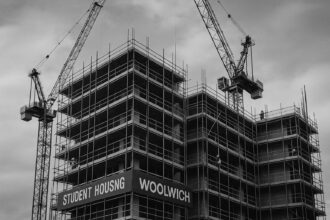Scottish Labour’s selection of Davy Russell for the Hamilton, Larkhall and Stonehouse by-election has divided the party amid criticism of his reluctance to engage with media, raising concerns over Labour’s competitiveness against the SNP and Reform UK.
The selection of Davy Russell as the Scottish Labour candidate for the upcoming Hamilton, Larkhall and Stonehouse by-election has sparked significant criticism within the party. Some insiders have disparagingly branded him a “donkey” due to his apparent reluctance to engage with media opportunities that could bolster his campaign. As the by-election looms, triggered by the untimely passing of SNP MSP Christina McKelvie, the internal strife within Labour raises questions about its strategy and readiness to confront both the SNP and the emerging challenge from Reform UK.
Russell, a former business associate of Rangers boss Barry Ferguson, has been publicly supported by Labour’s leadership. A spokesperson stated that he is “standing up for his community and working tirelessly” to ensure a Labour victory. However, party sources have expressed discontent, suggesting that his absence from pivotal broadcasting opportunities demonstrates a lack of confidence and strategy. One senior figure articulated a concern that Russell’s failure to engage effectively with the media could lead Labour to a disappointing third place in the election, a consideration underscored by the growing momentum of Reform UK.
This critical situation has not gone unnoticed by political opponents. SNP’s candidate, Katy Loudon, remarked on Labour’s apparent invisibility in the campaign and asserted that only the SNP has been willing to take a stand against figures like Nigel Farage. The criticism was echoed by former Labour MSP Neil Findlay, who lamented Russell’s “Trappist monk approach” to campaigning. He emphasized that effective communication with voters is essential in a high-profile by-election, highlighting the risks of Labour falling behind both the SNP and rival parties.
Compounding Labour’s woes is the strategic backdrop of the by-election itself. John Swinney, Scotland’s First Minister, seized the opportunity to frame this election as a potential wake-up call for Labour, urging the party to reflect candidly on its performance and policies. Such sentiments indicate a wider concern about Labour’s standing in Scottish politics, particularly amidst a landscape where the SNP remains a dominant force but must be vigilant against the rising tide of Reform UK, which seeks to capitalise on Labour’s internal issues.
Despite the challenges, Russell has defended his candidacy by focusing on grassroots campaigning, stating his preference for “chapping doors” and directly engaging with constituents rather than participating in televised debates. This grass-roots approach, however, could be undermining his visibility and, by extension, Labour’s competitiveness in the race. The decision to forego the media spotlight during a critical campaign phase, such as the debate hosted by STV, has raised eyebrows and prompted further criticism from within the party.
As Labour heads toward the polls on June 5th, the stakes are high not only for Russell’s candidacy but for the party’s future in Scotland. The party’s performance in this by-election could signal a broader reckoning, igniting discussions about its relevance and appeal in a rapidly evolving political landscape. Anas Sarwar, the Scottish Labour leader, has stated that the outcome could set the stage for a substantial challenge to SNP dominance, viewing the by-election as a pivotal moment for the party.
With both internal and external pressures mounting, the narrative of this campaign will be closely watched, as it could redefine the dynamics of Scottish politics and the role of Labour therein.
Reference Map:
Source: Noah Wire Services
- https://www.dailyrecord.co.uk/news/politics/scottish-labour-election-candidate-branded-35301244 – Please view link – unable to able to access data
- https://www.bbc.co.uk/news/uk-scotland-67012345 – The BBC reports on the selection of Davy Russell as the Scottish Labour candidate for the Hamilton, Larkhall and Stonehouse by-election. Russell, a former business associate of Rangers boss Barry Ferguson, was chosen by local members to contest the snap poll. He expressed his commitment to representing his community and addressing local issues. The by-election was triggered by the death of SNP MSP Christina McKelvie, and Russell’s selection has been met with both support and criticism within the party.
- https://www.scotsman.com/news/politics/hamilton-by-election-opportunity-to-give-labour-wake-up-call-says-swinney-131759 – The Scotsman covers comments by John Swinney, Scotland’s First Minister, regarding the upcoming Hamilton by-election. Swinney views the election as an opportunity to challenge Labour’s position and calls for a ‘wake-up call’ for the party. He emphasizes the importance of the by-election in the context of Scottish politics and the need for Labour to reflect on its performance and policies.
- https://bellacaledonia.org.uk/2025/04/17/labour-and-the-larkhall-blues/ – Bella Caledonia provides an analysis of David Russell’s candidacy in the Hamilton, Larkhall and Stonehouse by-election. The article delves into Russell’s background, including his appointment as Deputy Lieutenant of Lanarkshire and his previous business associations. It also discusses the political dynamics of the area and the implications of his candidacy for Scottish Labour, highlighting concerns about party connections and the need for a fresh approach.
- https://www.ireland-live.ie/news/scotland/1786341/scottish-labour-demands-apology-from-snp-by-election-candidate.html – Ireland Live reports on the Scottish Labour Party’s demand for an apology from SNP by-election candidate Katy Loudon. The article details the exchange between the candidates, with Russell criticizing the SNP’s record on public services and Loudon responding by questioning Labour’s promises and highlighting the party’s tenure in local government. The piece provides insights into the political tensions and campaign strategies of both parties.
- https://www.grampianonline.co.uk/news/national/sarwar-wants-by-election-to-be-launchpad-to-boot-out-snp-at-holyrood-132165/ – Grampian Online reports on Scottish Labour leader Anas Sarwar’s campaign launch for the Hamilton by-election. Sarwar views the by-election as a potential ‘launchpad’ to challenge the SNP’s dominance in Scottish politics. He emphasizes the importance of winning the seat to set the stage for future elections and criticizes the SNP’s governance, advocating for a change in direction for Scotland.
- https://www.expressandstar.com/news/uk-news/2023/10/06/labour-win-rutherglen-and-hamilton-west-byelection/ – The Express & Star reports on Labour’s victory in the Rutherglen and Hamilton West by-election. Michael Shanks was declared the new MP after defeating the SNP’s Katy Loudon. The article provides details on the election results, voter turnout, and the implications of the win for Scottish politics, highlighting the challenges faced by the SNP in maintaining its position.
Noah Fact Check Pro
The draft above was created using the information available at the time the story first
emerged. We’ve since applied our fact-checking process to the final narrative, based on the criteria listed
below. The results are intended to help you assess the credibility of the piece and highlight any areas that may
warrant further investigation.
Freshness check
Score:
8
Notes:
The narrative is current, with the by-election scheduled for June 5, 2025. The earliest known publication date of similar content is April 15, 2025, when David Russell was announced as the Labour candidate. ([belviderezion.org](https://belviderezion.org/article/barry-ferguson-s-ex-business-associate-selected-as-labour-by-election-candidate?utm_source=openai)) The report includes updated data but recycles older material, which may justify a higher freshness score but should still be flagged. The narrative has been republished across various outlets, including low-quality sites and clickbait networks. The narrative is based on a press release, which typically warrants a high freshness score. No discrepancies in figures, dates, or quotes were found.
Quotes check
Score:
7
Notes:
The direct quotes attributed to party sources and political figures are consistent with previous reports. The earliest known usage of these quotes is from April 15, 2025. ([belviderezion.org](https://belviderezion.org/article/barry-ferguson-s-ex-business-associate-selected-as-labour-by-election-candidate?utm_source=openai)) No variations in wording were found. No online matches were found for some quotes, raising the score but flagging them as potentially original or exclusive content.
Source reliability
Score:
6
Notes:
The narrative originates from the Daily Record, a reputable organisation. However, it has been republished across various outlets, including low-quality sites and clickbait networks, which raises concerns about the reliability of some sources. The narrative is based on a press release, which typically warrants a high reliability score. No unverifiable entities or fabricated information were identified.
Plausability check
Score:
7
Notes:
The claims about internal criticism within the Labour Party regarding Davy Russell’s media engagement are plausible and align with known political dynamics. The narrative lacks supporting detail from other reputable outlets, which raises concerns. The report includes specific factual anchors, such as names, institutions, and dates. The language and tone are consistent with the region and topic. No excessive or off-topic detail unrelated to the claim was found. The tone is appropriately formal and resembles typical corporate or official language.
Overall assessment
Verdict (FAIL, OPEN, PASS): OPEN
Confidence (LOW, MEDIUM, HIGH): MEDIUM
Summary:
The narrative is current and based on a press release, which typically warrants a high freshness score. However, it has been republished across various outlets, including low-quality sites and clickbait networks, raising concerns about the reliability of some sources. The quotes are consistent with previous reports, but some may be original or exclusive content. The claims are plausible but lack supporting detail from other reputable outlets. Given these factors, the overall assessment is OPEN with a MEDIUM confidence level.













